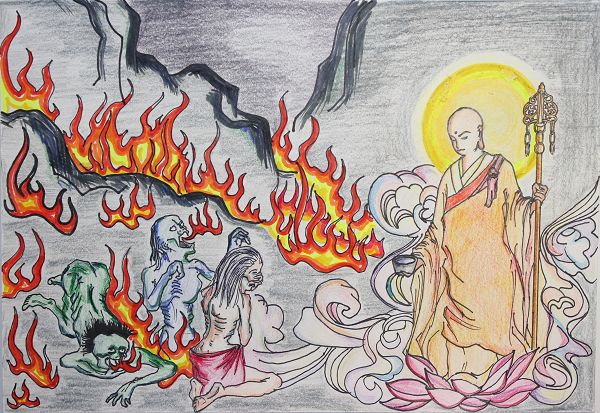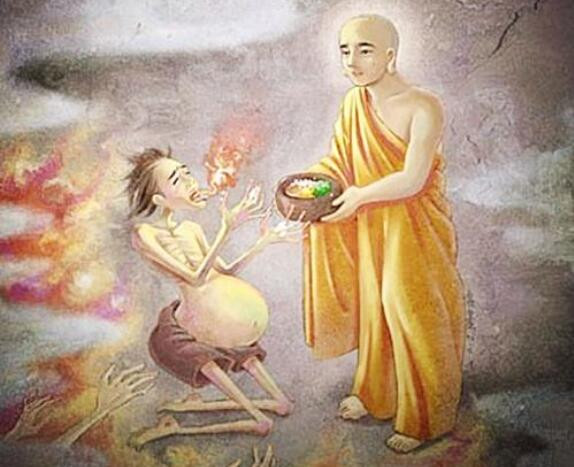China
The concept of hell in China appeared directly with the advent of Buddhism in the 1st century. Until that time, the Chinese did not have a formed image of the afterlife.
The Chinese got acquainted with the concept of heaven and hell simultaneously with the assimilation of alien religions.
Buddhism brought with it the belief in the transmigration of souls.
The Buddhist idea of retribution has acquired a number of very specific features in China, such as a strict bureaucratic system that administers karmic retribution.
This system is equipped with all possible types of services characteristic of the Chinese state.
It is interesting that this tradition is still alive to this day, and still new sections appear in the descriptions of afterlife departments that meet the peculiarities of the time (special rooms for abortion victims, services dealing with those who died in car accidents, etc.).
In the Chinese worldview there is no analogue of the European paradise. What is called heaven in Sinological literature is actually something like a threshold to nirvana.
It is believed that if good karma is accumulated, one can be reborn in one of the paradises of the Buddhas, after which the final exit from samsara occurs.

According to Buddhist concepts, samsara consists of six worlds: the world of gods (devas), the world of demigods (asuras), the world of people, the world of animals, the world of hungry ghosts (pretas) and the world of hellish beings narakas.
The first three are considered auspicious births, and the last three are considered inauspicious. Beings take birth in one or another world depending on their karma, i.e., perfect deeds.
However, life is not eternal in any of the worlds. Being in any of them, even in the world of the gods, is suffering, and the only way to stop it is to leave samsara.
Diyu
In China, hell is called Diyu, literally translated as “underground prison”.
Ideas about Diyu are based on a combination of the Buddhist concept of “Naraka” with traditional Chinese beliefs about the afterlife, as well as many popular additions and new interpretations of these two traditions.
Diyu is a purgatory that serves to punish and renew the spirit in preparation for reincarnation in the next life.
The names of the hells themselves were conveniently invented, they are most often descriptive, that is, it is immediately clear what happens to sinners in this or that hell.
For example, “Hell, where they beat on the knees” or “Hell, where they hang upside down.”
Each of the ten chambers of hell had its head, but the most influential among them was the head of the fifth chamber, Yanlovang, a modification of the Buddhist Yama.
It was through his department that the souls of people who had various sins passed – from the disrespectful use of inscribed papers to murder.
Initially, in Buddhist mythology, Yanlovang was the lord of the Heavenly Paradise.
He had two assistants, special dogs, who roamed the earth, found those who were about to die, and brought them to Heaven.

Over time, Yanlovang turned into the lord of hell.
First, the guardian spirits of hell meet the dead and escort them to the first hall of the underworld.
The judge of the first hall interrogates the soul of the deceased, if it turns out that she has no sins, she is immediately sent to the 10th hall.
If there are sins, the soul is brought to a huge round mirror, in which all the evil deeds of the dead are shown.
After that, sinners are led to the second and subsequent halls. In each of them, the supreme judges of the halls judge them and impose punishment for various offenses.
In total, the Jade Tablets (one of the books that shaped the idea of the afterlife in China) speaks of 138 hells: from the second to the ninth, each hall has one large hell and 16 small ones, and, in addition, more there are 2 additional, not related to any hall, hells, which are called “Pond of blood slurry” and “City of the untimely dead.”
If in one of the halls it is discovered that the soul has no sins for which it is punished in this hall, it is immediately escorted to the next hall.
Having passed all 9 halls in this way, the souls enter the last, tenth hall, where they are given a drink of oblivion, thanks to which they cease to remember their previous lives and ordeals in hell.
And then, depending on karma, they acquire a new life in the form people or animals.In addition to such a “standard” route through hell, there are some others.
For example, some souls can remain to serve in hell, and the souls of the dishonored and dead because of this, the girls are allowed to turn into demons and take revenge on their offenders.